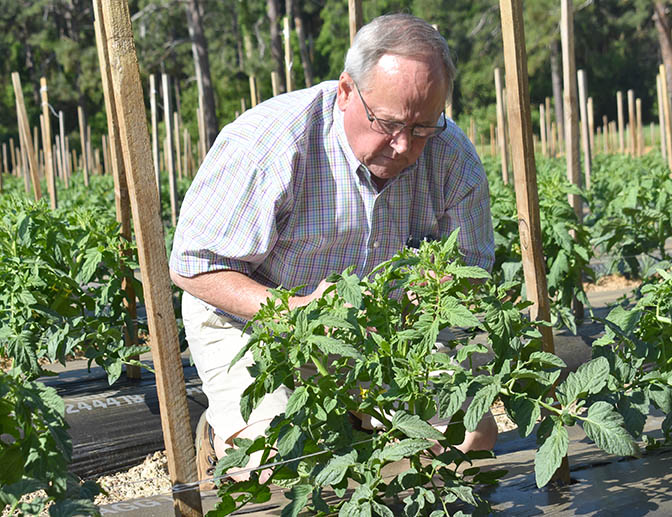By Clint Thompson
Georgia farmer Bill Brim faces his share of challenges producing spring and fall crops in Tifton. But one worry haunts him daily: Where his grandchildren and future generations will get their food.

“It’s going to come from the south of us (Mexico imports), and it’s going to be controlled by other people that you don’t want to be in control,” says Brim.
It is what motivates him to continue the educational effort that comes with being a farmer in the Southeast. He yearns for consumers to see the value in what farmers bring to the table and support locally grown produce. Brim wants consumers to understand that food does not just magically show up in the grocery stores and on plates in local restaurants. It originates from farming operations, like Lewis Taylor Farms in Tifton, where he is a co-owner.
“Agriculture is always separated from everybody else who thinks agriculture doesn’t really matter, but it really does matter,” Brim says. “If you like to eat, it matters. Ever since I’ve been in it, and that’s 35 years, it’s been that way.”
PANDEMIC CHALLENGES
As hard as it is to fathom, Brim’s challenges as a farmer only worsened on the heels of the coronavirus pandemic. Input prices have skyrocketed. Supply availability is an issue. Yet, market prices have mostly remained stagnant.
“Production is the easy part of it. It’s the harvest and making the crop. Planting is one thing, but you’ve got to be able to run your business and make a good crop and then sell it for a good price. That’s the bottom line,” Brim says. “We all know how to make a crop. It’s just a matter of all the other obstacles we’ve got to go through. Like all the materials we’ve got to buy to spray with have gone up, anywhere from 8% to 40%. Land rent has gone up. Boxes, materials have all gone up. Fertilizer has gone up, everything that you can think of right now. We’re fighting a losing battle it seems like. Everybody is talking about how much everything has gone up, but produce prices haven’t gone up that much.
“It’s a daily struggle for all of us that are in agriculture. We’re battling so many different things that it’s not just farming and making a good crop, it’s all about the politics of it.”

AG ADVOCATE
Despite the challenges, Brim embraces every day as an opportunity to promote his way of life. It’s an effort not lost on his colleagues and collaborators.
“If you look at his commitment to agriculture, it encompasses all of us. He fights to protect and preserve the family farm as we face many of these challenges, whether it’s regulatory challenges or labor challenges,” says University of Georgia (UGA) Extension weed specialist Stanley Culpepper. “He’s always involved, always creative, always pro-agriculture and always pro-farmer. He makes time to address these challenging issues. He’s a very unique and very giving person.”
Brim testified during the U.S. International Trade Commission (USITC) hearings held in the last two years regarding the impact that imports have had on domestic production. Brim’s passion was evident. He was emotional, breaking down almost to tears when talking about how farmers’ livelihoods have been systematically altered by decades of increased imports from other countries, namely Mexico.
“I am here because I believe in Georgia farmers. I believe our industry is worth fighting for,” said Brim during the USITC hearing on cucumbers and squash. “Please do the right thing and help us preserve this way of life that means so much to me.”
Brim’s advocacy for agriculture is just one part of his leadership in the specialty crop sector. He established himself as a leader when he, along with Ed Walker, purchased Lewis Taylor Farms in 1985. The two helped transform Lewis Taylor Farms into a diversified transplant and vegetable production operation.
Upon purchase, the farming operation in South Georgia had only 87,000 square feet of greenhouse production space. The farm now boasts 81 greenhouses with more than 649,000 square feet of production space.
Brim’s experience and knowledge in vegetable production made him a natural fit to collaborate with scientists from the UGA College of Agricultural and Environmental Sciences in various research projects with far-reaching implications. His work with Culpepper dates back 20 years and involved one of the major production-altering transitions in the industry — the phaseout of methyl bromide. Alternatives that originated in Brim’s fields are still being used today.
“Look at his commitment to the University of Georgia and Cooperative Extension Service. He’ll fight for Extension and fight for the farmer. He just fights for any component within agriculture. It encompasses a lot of his time, but he always makes time to go to battle to protect the family farm and everybody else that’s involved in agriculture,” says Culpepper, who has also conducted weed control research projects in at least 15 vegetable crops at Lewis Taylor Farms.
“I can’t think of anybody that commits more of their individual time in support of Georgia agriculture and agriculture across our region and the country than Bill. He is arguably the busiest person that I’ve ever met, but he makes more time available for others than anybody else I’ve met.”

SPEAKING UP
Brim’s best quality may be his willingness to speak his mind and stand up for farming colleagues everywhere at the state and national levels. He served on the U.S. Department of Agriculture (USDA) Farm Service Agency State Committee, where he reviewed and interpreted USDA policy and guidelines relating to farm bill programs and the implementation of on-the-farm applications for farmers and agricultural businesses across Georgia.
“Bill has made a huge impact on the industry throughout his career, and his dedication to his fellow growers will result in this impact lasting for generations to come. He has always been there to help regulators, elected officials and others understand the unique challenges that specialty crop producers face,” says Chris Butts, executive vice president of the Georgia Fruit and Vegetable Growers Association (GFVGA).
“While there’s still a lot of work to do, the industry and the opportunities it presents to our growers have benefited from Bill’s work, and we are grateful for the leadership he has provided within GFVGA and beyond.”
Not too many farmers will leave a legacy that is comparable to Brim’s; a successful producer who looks out for the future of the average farmer. Brim reflected on his legacy and impact prior to being inducted into the Georgia Agricultural Hall of Fame in 2019.
“Somebody’s got to speak up. I just happened to be the one that wasn’t scared to speak up and talk about what we needed,” Brim says.
What agriculture needs is more growers like Brim.









